We’ve all heard that SEO is an essential aspect of digital marketing for travel and hospitality destinations such as resorts.
At a basic level, it involves optimising a resort’s website to rank higher in search engine results pages (SERPs) for relevant keywords and phrases. This helps increase the visibility of the resort’s website, drive more traffic, and ultimately lead to more bookings.
But SEO is changing, and savvy resorts need to understand the nuances of how search engines work for travel queries in 2024.
In this guide, we’re going to explain the importance of SEO for building qualified traffic to your resort website. We’ll show you how to drive more bookings for your resort with 9 different SEO strategies, including on-page, local SEO and content marketing, all of which will help your resort website to gain the positions that matter on the SERPs.
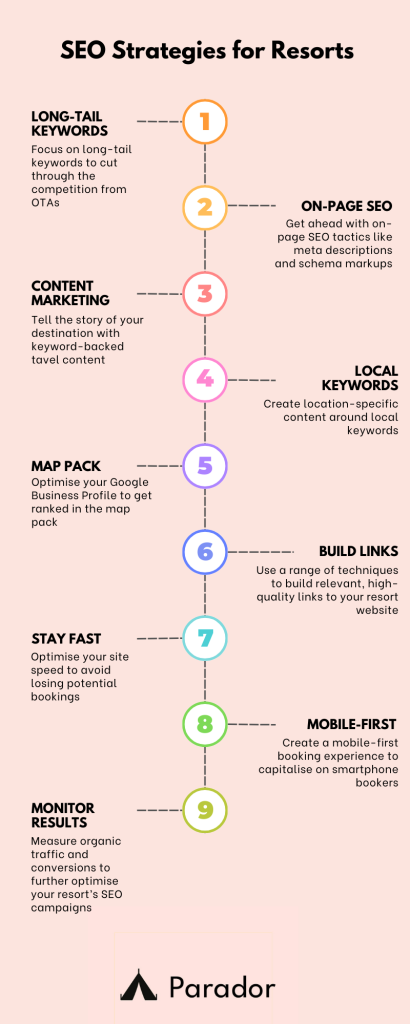
The importance of SEO for resorts
Since resorts typically appeal to a specific clientele – often individuals who have a certain disposable income – it can be challenging for resorts to connect with their target audience through conventional marketing channels.
SEO provides a strategic advantage for holiday resorts by allowing potential customers to discover your business organically when they search for relevant keywords on search engines like Google, Bing, or Yahoo, as opposed to the ‘traditional’ travel marketing approach of actively seeking out potential clients who may not have the time or inclination to engage with you.
Because 9 out of 10 travel bookings begin with a search engine query, optimising your website for search makes absolute sense; most significantly, it means that your target audience can easily find and engage with your offering without the need for proactive outreach on your part.
SEO builds consumer trust
Booking a resort holiday can be a significant decision for potential customers, involving considerations such as cost, amenities, location, and overall experience. In this context, trust plays a crucial role in influencing the decision-making process.
SEO is a way of building and reinforcing that trust, making your resort more appealing and increasing the likelihood that customers will choose it over competitors.
Resorts that appear prominently in search engine results are often perceived as more credible and trustworthy. High rankings suggest that the resort is popular, well-regarded, and relevant to the search query, instilling confidence in potential customers.
To sum up, SEO is great for travel because it:
- Allows potential customers to find you at the point they are ready to engage
- Confers trust upon your brand, building confidence for potential bookers
How Search Engines Work for Travel Queries
The main factors that influence a resort’s ranking on search engines include:
- Keywords: using relevant keywords in the website’s content, meta tags, and URLs help search engines to understand what the website is about and rank it higher for relevant queries.
- Google Business Profile: creating and maintaining an up-to-date Google Business Profile which lists all of the crucial information and amenities about your resort will help to rank your resort for local keywords.
- Content: having high-quality, expert content related to the area around your resort helps to establish the resort’s authority and credibility, which helps with E-E-A-T, a ranking factor for search engines.
- Backlinks: having other reputable websites in the travel domain link to the resort’s website can improve the authority of the site, which helps boost rankings across the board.
- Technical SEO: making sure your website loads quickly and is mobile-optimized plays an important role in creating a user-friendly experience and reducing booking abandonment.
We’ll go into each of these aspects, and how to make them work for your resort website, in the following sections. Let’s dive in! 🌴
9 SEO strategies for resorts in 2024
1. Focus on long-tail keywords
When people decide to travel to a resort, they are looking for a very specific experience.
The way to reach those searchers is by tailoring your keyword strategy to the aspects that make your resort stand out from others. One effective method of undercutting the stiff competition in the travel sector is by using long-tail keywords.
For example, trying to target a general keyword like ‘resorts in Greece’ is what we might call a ‘shotgun’ approach. You’ll find yourself competing with hundreds of other holiday resorts, some of them with huge budgets that might be part of international hotel and resort chains.
That’s not to mention OTAs (online travel agents) and metasearch sites, which have hundreds of related pages and ‘listicles’ to back up their rankings for high competition keywords like ‘resorts in Greece’.
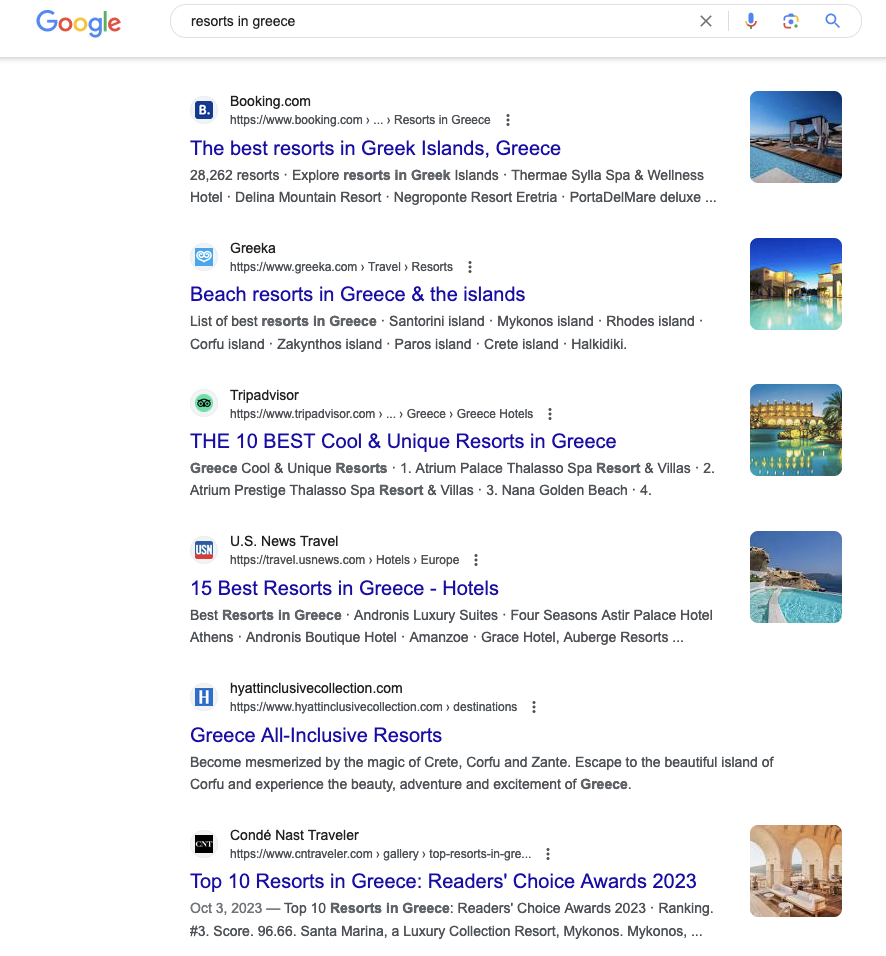
However, if you were instead to target a longer keyword like ‘greece resort with cave pool’, the number of competitors reduces drastically. This long-tail keyword zooms in on a specific offer, and so optimizing a page around this keyword will increase your chances of being visible on the search engine results pages.
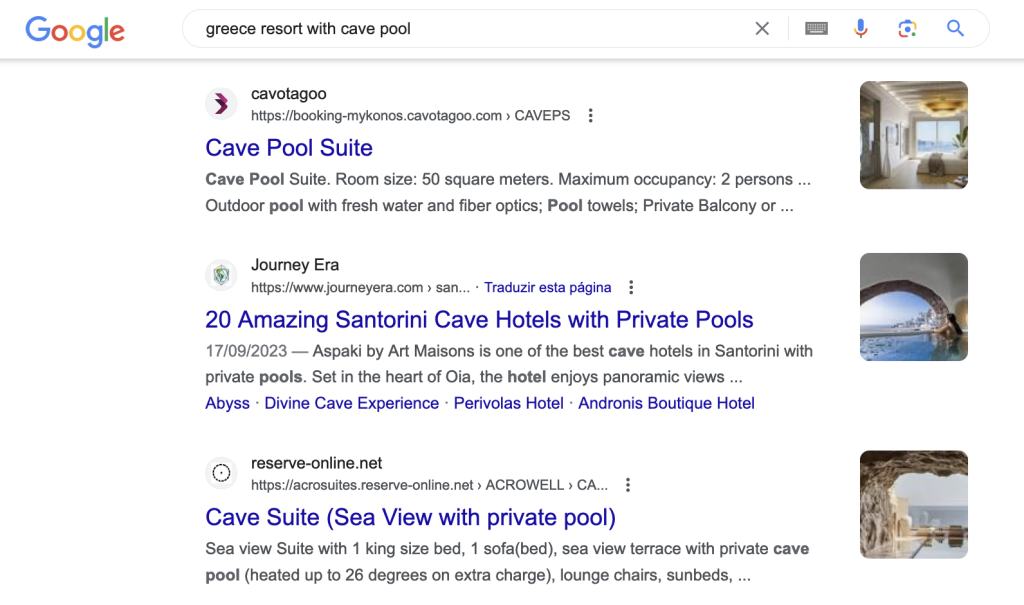
The first organic result for ‘greece resort with cave pool’ is occupied by an independent luxury resort who have optimized their page around this long-tail keyword that has much less competition. As such, they have been able to outrank OTAs and other competitors, and take the lion’s share of traffic from Google.
Read more: our guide to search engine optimisation for luxury travel brands
Hence, you can see how fine-tuning your keyword selection based on the specific attractions of your resort can give you an edge over your competitors and increase the number of queries that your website achieves a strong ranking for.
Even if some long-tail keywords have a low or zero-search volume in a keyword tool like Ahrefs, that doesn’t mean there aren’t people who are searching for that keyword. Moreover, the people who do search them are often looking for an offering exactly like yours.
For this reason, long-tail keywords represent the best solution for resorts looking to stand out from the crowd in a saturated travel marketplace.
For more information on how to do long-tail keyword research for travel, read the keyword research section of our guide to SEO for tour operators, which can also be applied to resorts to help find your ideal clients.
2. Nail on-page SEO
On-page SEO is the practice of optimizing the content of individual web pages to rank higher, by making them more understandable to search engines.
On a superficial level, this means naturally weaving your chosen keywords into your website’s content, such as in headings, meta titles, meta descriptions, and alt tags for images.
For resorts, good on-page SEO is particularly important on pages that describe the different rooms, packages and amenities available at your resort.
Since these pages can potentially appear in search engines when somebody searches for a query that matches your offering, you should make sure that your main pages answer all the questions that a potential guest might have.
And because these are the questions people ask in search engines when they are already in your marketing funnel and/or considering making a booking, including as much information as possible is key to success here.
Examples of information to write about on your main room and amenity pages include:
- Check-in and check-out times
- Pet policy
- Resort dining options
- Spa, gym and fitness facilities
- Facilities for children
- Wifi availability
For more ideas about what to include here, go out and speak to your staff! Your front desk staff will know what the most common questions are from guests. You can also look for potential questions and issues raised in your online reviews.
Once you have a comprehensive list of all the questions someone might have about your resort, you could consider adding the questions as an FAQ section on your important pages, and wrapping it in FAQPage schema markup. This is a way of giving immediate answers to searchers on the SERPs, which will mean people won’t even have to click through to a link in order to get the necessary information about your hotel.
Use Google’s Structured Data Testing Tool to test whether your markup is implemented correctly, and submit the updated page to the index through Google Search Console.

Tackling on-page SEO with a holistic approach that covers all the information someone might need, and presenting it in the most convenient manner for searchers, will give you a competitive advantage over other resorts in your area and ultimately help to clinch more of those all-important reservations.
3. Tell a story with content marketing
We’re firm believers that content marketing is the best way to gain credibility, position yourself as an authority, and build connections with your ideal clients at each stage of their travel planning.
To attract your ideal resort clients in 2024, you have to sell the dream, and content marketing is the best way to do that.
Get direct bookings through SEO content
Outrank the OTAs and fill your calendar with direct bookings using Travel Content Pro, our end-to-end SEO content marketing service.
Pricing Plans
Content marketing is a form of destination marketing, because it allows you to capture potential bookers at the ‘dreaming’ stage. By writing and sharing valuable and relevant content on your site, backed by SEO know-how that puts that content in front of potential bookers, you can build trust, establish authority, and ultimately drive more bookings to your resort.
But the content you write should also be helpful, especially since Google’s September 2023 Helpful Content update, which signaled an increased emphasis on ‘creating helpful, reliable, people-first content’.
In our experience, the best way to get ahead of the competition in the changing world of search is by writing comprehensive, keyword-backed posts on topics such as the local area, things to do, and places to eat, and populating these posts with original content such as expert insights, original photographs, infographics, and videos.
Some ways to do make your content more helpful are:
- Consider your audience by mapping out their interests, pain points, and motivations, and deciding what kind of content they’re looking for (we wrote about this extensively in our guide to SEO for tour operators).
- Include insights from experts on your destination that go above and beyond other ranking posts. Are you writing a post about a local event or festivity happening in the area around your resort? Go out and get quotations from the organizers. This increases the credibility and originality of your article, making it more helpful for readers.
- Use unique photographs and videos for each post, and avoiding recycling photographs from your OTA listings or other parts of your site.
- Consider implementing clustering or ‘topical mapping’, which is a way of organizing blog content into silos or clusters of related knowledge. Doing this will make the expertise of your site clear to Google, and provide a more helpful experience for users who land on your website from search.
- Carry out ‘social media listening’: by monitoring social media conversations related to your destination, you can gain insights into the questions that potential resort guests are using to describe their needs and preferences, and address those concerns within your content.
If you need help with devising and executing a solid content marketing strategy for your resort website, get in touch today to see how our Travel Content Pro packages can help level up traffic and win successful bookings for your resort.
4. Find your local keywords 📍
Creating location-specific content on your resort’s website is essential to capture people searching for local keywords.
Local keywords are navigational keywords, such as ‘resorts in Scotland’, and they can be targeted with blog posts, landing pages, and other content that showcases your resort’s location and nearby attractions.
When somebody types in a local keyword, Google displays three sets of results: firstly, targeted ad placements, secondly, the map pack of businesses that match that query, and thirdly, organic results.
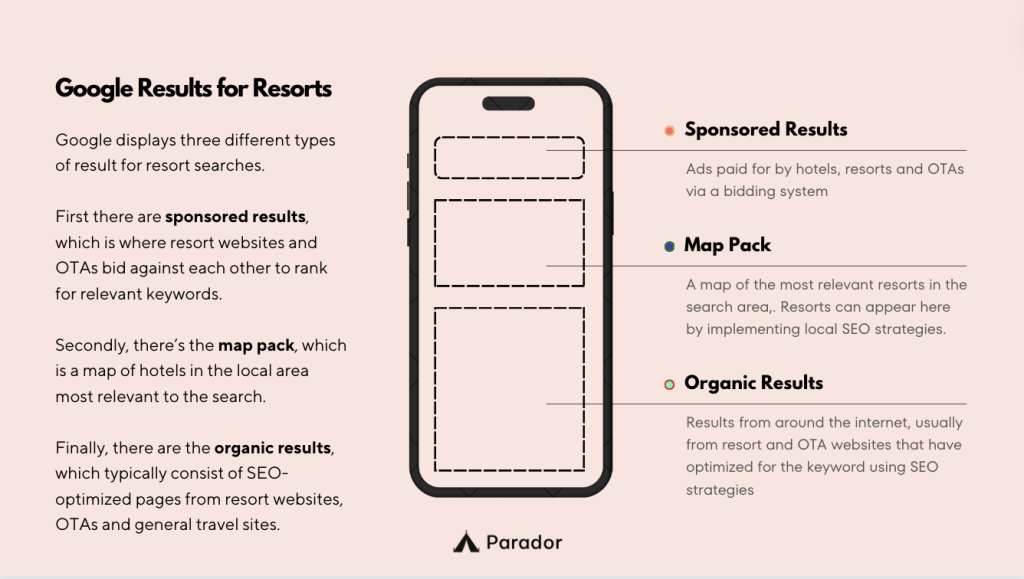
Local SEO focuses on the second and third of those sets of results, because that’s where resorts can gain visibility with long-term investment, rather than having to pay per click for ad placements.
Show your business to interested travelers
Our Local Visibility package drives exponentially more bookings from local search to your business, month-on-month, year-on-year.
Find out how
The most obvious place to start for local keywords would be ‘resorts in [your location]’. Use a free tool like Google Keyword Planner to check the search volume for resorts in your location, then check the search results themselves.
Once you have a list of local keywords, create separate landing pages optimized around those keywords. For more general keywords like ‘resort in [your location], consider optimizing an existing page, such as your homepage, to rank for that keyword.
These landing pages, if set up properly, will increase your organic visibility for local keywords, which is ranking factor for another set of results: the map pack.
5. Get ranked in the map pack
The location-based businesses that display at the top of the search results when somebody types a navigational keyword into Google, such as ‘resorts in [area]’, are together known as the map pack.
To get shown in the map pack, you first need to get a Google Business Profile. Optimizing your Google Business Profile is a big part of ranking in the map pack, which is one of the most important steps for businesses like resorts that derive a large part of their value proposition from their location.
The reason for this is simple: people are more likely to book a resort that appears at the top of the search results.
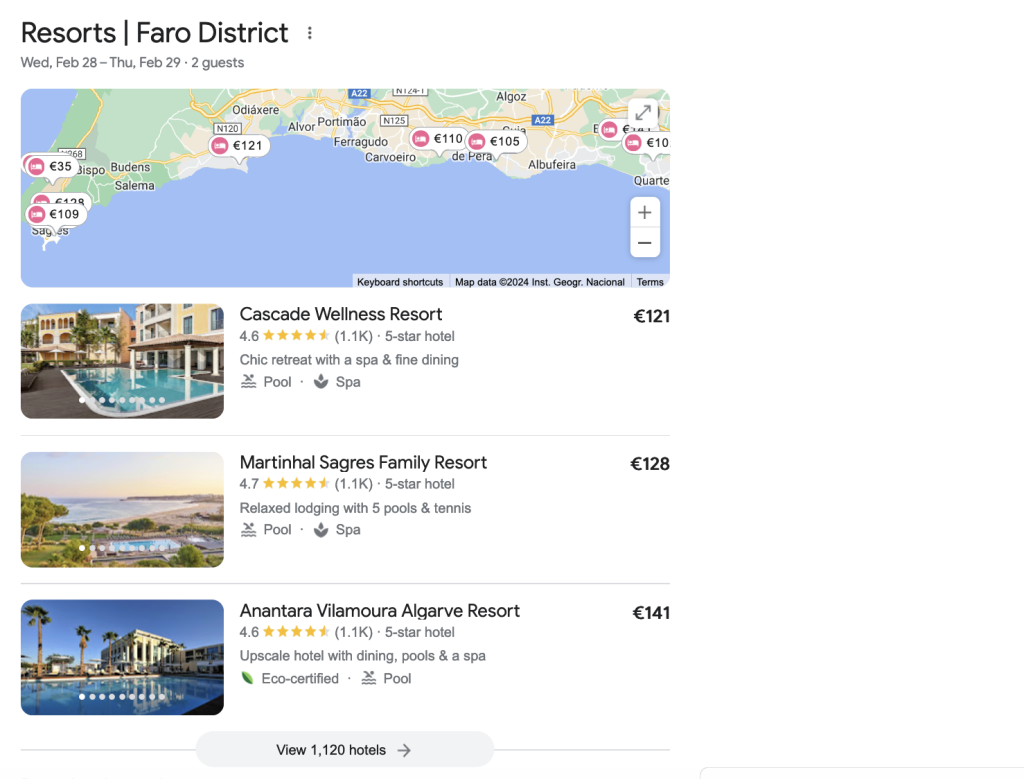
There are various tasks involved in optimizing your Google Business Profile for the map pack, but the main aim here is to make your listing as comprehensive as possible for users and search engines.
This means filing out all the given fields that show information about your resort, displaying accurate opening hours, indicating which amenities are available, uploading recent, high-quality pictures, and ensuring that your nightly pricing information is accurate.
The more amenities you list, the more chance Google has to serve your resort’s profile for relevant terms.
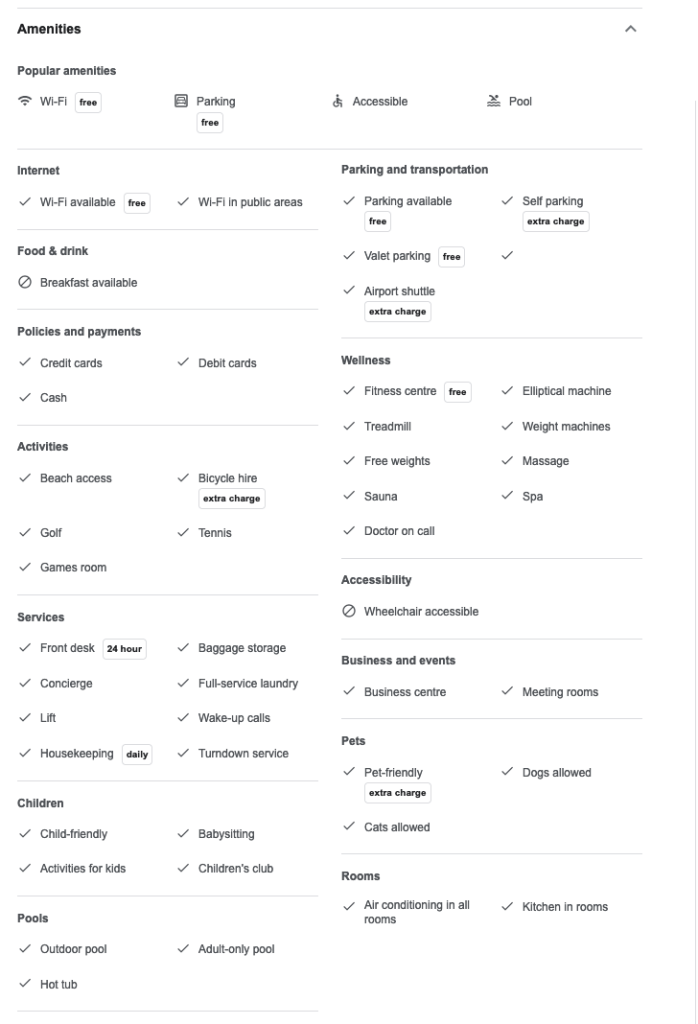
You should also make sure that your resort’s name, address, and phone number (NAP) are submitted to a range of different, reputable online directories, and that the details of your resort are consistent across each online directory. This includes Google My Business, Yelp, and other travel-related directories.
Finally, reviews on your Google Business Profile have a huge influence on your ranking, because search engines prioritize businesses with good reviews. By encouraging feedback, managing reviews and responding effectively to any negative feedback, you make it more likely for your resort to appear in relevant local searches.
For a more in-depth guide on how to do local SEO for your resort, read our guide to local SEO for hotels, which is fully applicable to resorts, too.
6. Build out relevant, high-quality backlinks
An extremely valuable tactic to help get your resort positioned in the top spots on the SERPs is to build high-quality backlinks from related websites in the travel sector.
In essence, the more high-quality backlinks you have, the more credible your website appears to search engines. This is particularly important in an online search landscape dominated by OTAs sites and travel blogs, which tend to have lots of authority already built up by links pointing to them from sites in the same niche.
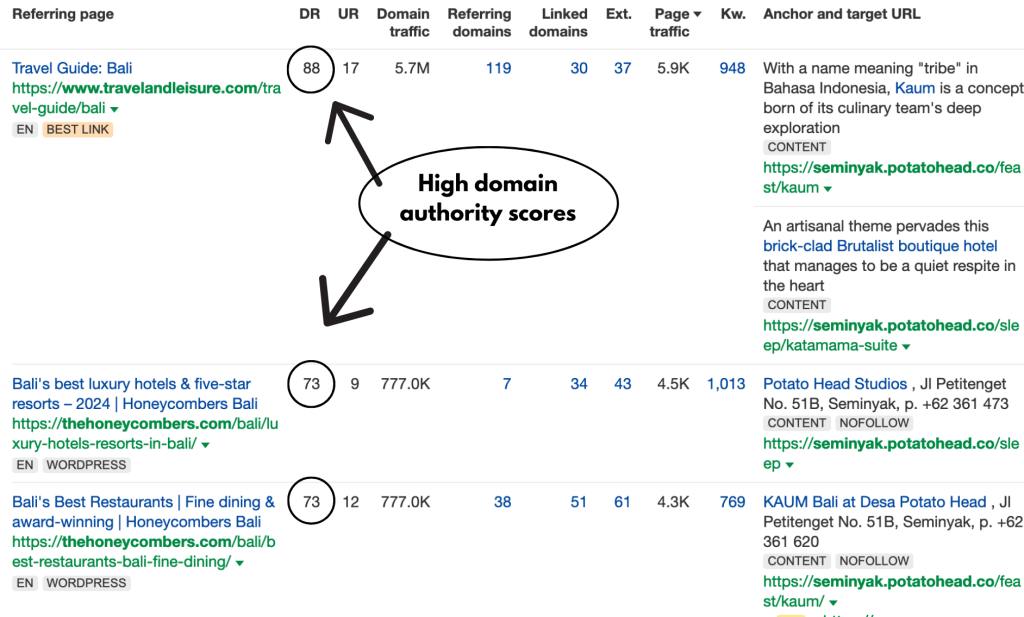
Resorts can use several techniques to acquire quality backlinks.
One of the most effective strategies is to develop a content marketing strategy, as covered in previous sections. The rationale here is simple: if you create high-quality, shareable content about your destination, other websites will want to link to it when writing their own content.
Another strategy is to reach out to related websites in the travel industry and request to write a guest post for their site, which typically include a link back to the author’s website.
You can surface a list of sites that will accept guest posts by searching queries like “guest posts” “your destination” into Google. Once you have a list of potential sites to pitch, check their domain authority with a free tool like Moz, and begin drafting up personalized emails to the sites with the highest authority.
It’s important to make sure that the websites you’re pitching to are relevant to your resort, since backlink relevancy also plays a part when search engines evaluate the backlink profile of your website.
Finally, consider reaching out to official travel websites like tourist boards and destination management organizations to see if they’d like to feature your resort on their site. These sites can have potentially very high domain authorities, and getting featured on their listings may be a win-win situation for both parties.
Read more: how to build hotel backlinks in 2024
7. Speed, speed, speed
Website speed is incredibly important for hospitality sites, not least because consumers will very quickly revert to an OTA to complete their booking if your site is slow. Similarly, Google can very easily bypass indexing sites that don’t load quickly in favor of a different one.
Some tips to increase your resort website’s speed include:
- Tone down large images and videos: Many resort websites feature very large panoramic image and video content on their main pages. While these might look good aesthetically, they can also take a toll on page speed, so consider compressing, reformatting or removing this type of content.
- Minify Code: Condense and minimize HTML, CSS, and JavaScript files, either using plugins in your CMS or with the help of a web developer, to reduce their size and speed up loading times.
- Use a Content Delivery Network (CDN): By using a CDN like Cloudflare, your website content is distributed across multiple servers globally, reducing latency for users in different locations. This is an especially effective solution for travel and hospitality sites, where potential bookers are likely to be accessing your site from across the globe.
- Use a headless CMS: Many resort sites are now switching to using headless CMS solutions for increased speed, which shows the front pages of your website via an API and allows SEO content to be prioritized in the back-end via a traditional CMS.
- Implement page speed recommendations: By using a free tool like GTmetrix, you can get tailored recommendations on how to increase the speed of your most important booking pages.
8. Create a mobile-first booking experience 📱
With research showing that over 30% of hotel bookings happen on mobile devices, creating a mobile-first booking experience is clearly the way forward
The aim with any mobile-first booking experience is to implement user-friendly, responsive design for mobile users, which will allow for easier navigation and efficient booking on smaller screens. This will help to reduce booking abandonment rate, which, at 81%, makes travel the most abandoned sector for online bookings, with most of this being a result of poor technical website performance.
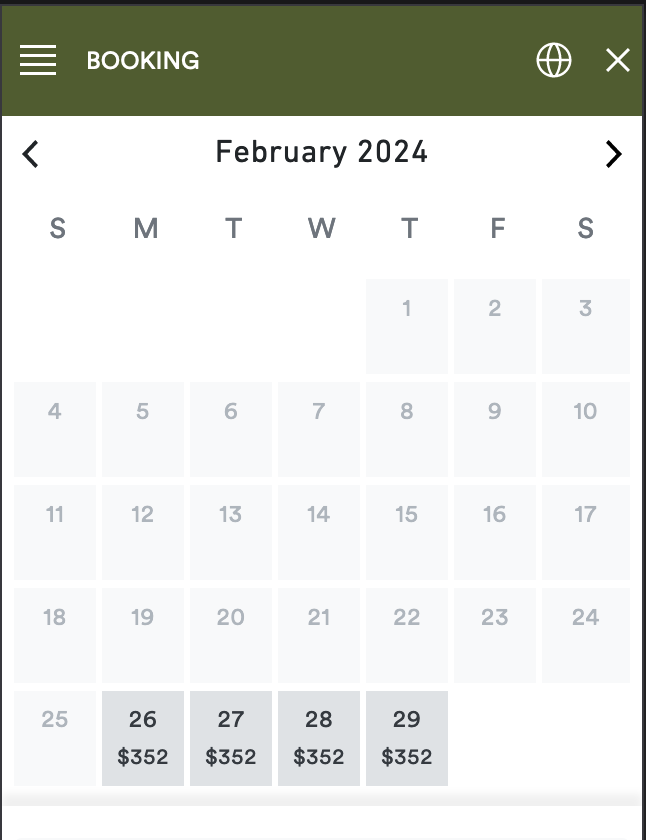
Streamlining forms, simplifying navigation menus, and offering secure mobile payment options are some of the most important aspects of a mobile-first approach, which will allow your resort website to cater to the preferences of modern travelers and boost visibility in the search engines.
9. Monitor and analyze your results
Once you’ve implemented the strategies outlined in this post for your resort, it’s vital to establish a system to evaluate the impact of your SEO efforts.
The most obvious metric to keep track of is keyword rankings for your main keywords in Google Search Console. While this is a good indicator of how well your content is optimized for specific keywords, however, it falls short in revealing how much traffic certain pages attract from Google.
A better way to measure the effectiveness of your SEO campaign is by looking at organic traffic and conversion rates. These metrics will give you a better picture of the overall effectiveness of your SEO campaign, because they tell you how people actually engage with your content, and what next steps they take after arriving to your website from the SERPs.
To measure organic traffic and conversion rates, you can analyze reports and set up specific goals for your content in Google Analytics. This will allow you to see how much time people spend on each page, which content is driving bookings or email sign-ups, and which pages you should optimize to better their performance.
SEO can supercharge your resort’s visibility 🚀
So, there you have it – 9 crucial strategies to skyrocket your resort’s visibility in the digital realm. From targeting specific, enticing long-tail keywords to creating a seamless mobile-first booking experience, these tactics are your key to winning in the online hospitality game.
Remember, SEO isn’t just about climbing search engine rankings; it’s about creating an online presence that captivates, informs, and converts. If you’re looking to craft a digital marketing strategy that ticks all these boxes, then working with a dedicated travel marketing agency can make all the difference in attracting guests to your resort. Fill out our form today and see how we can help you to embrace the digital potential of your resort 🌴🚀

